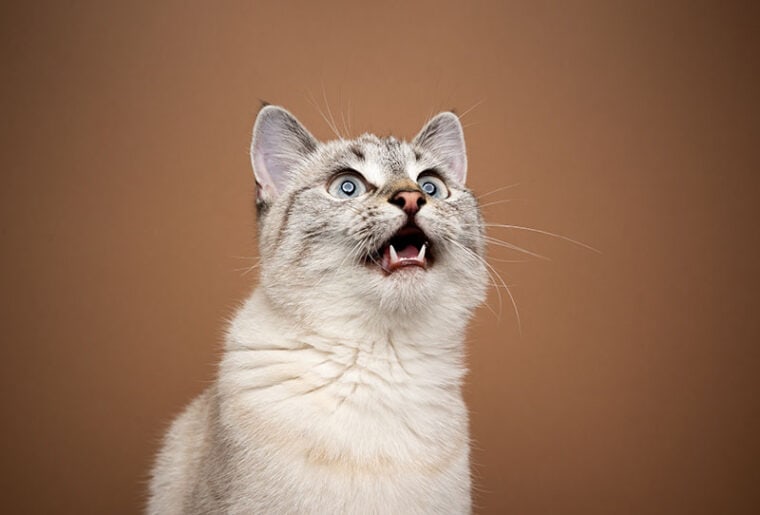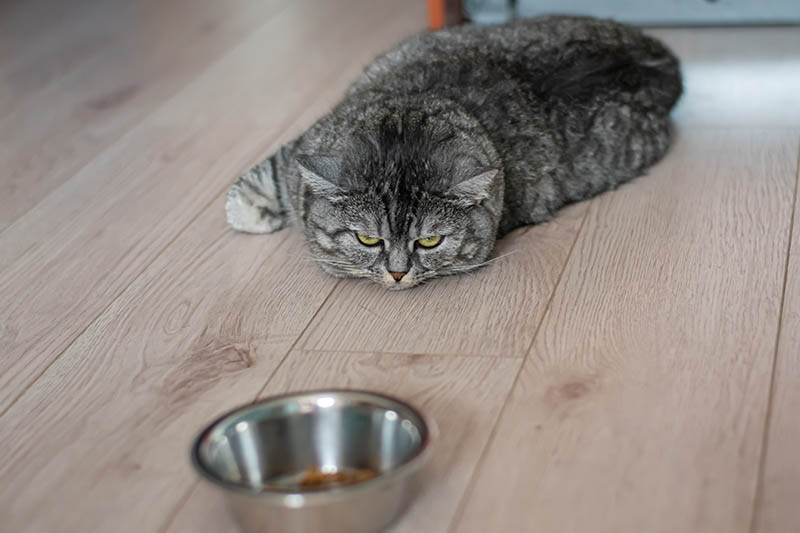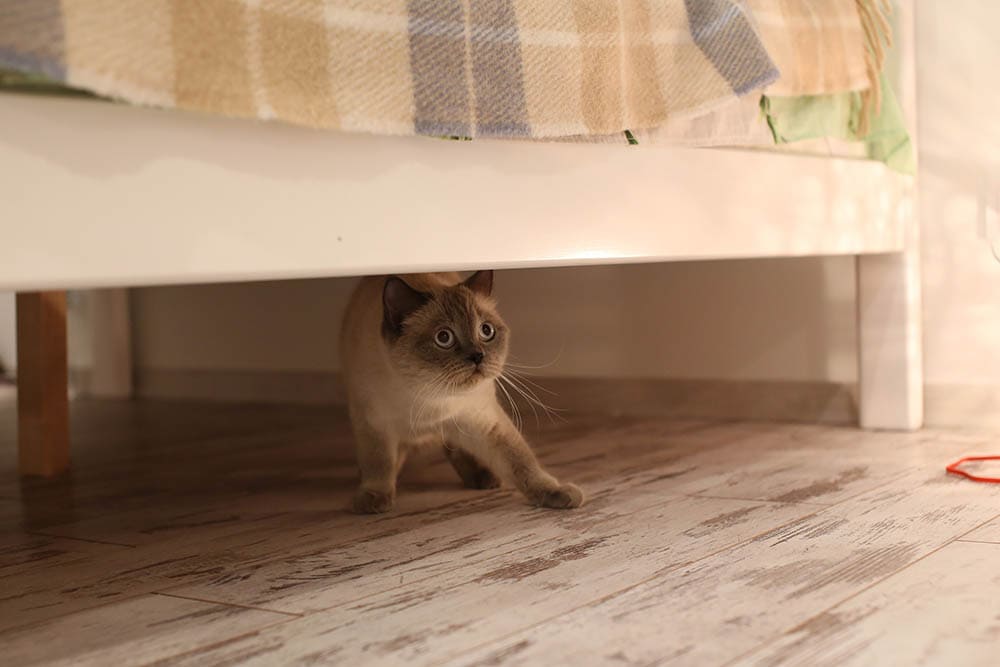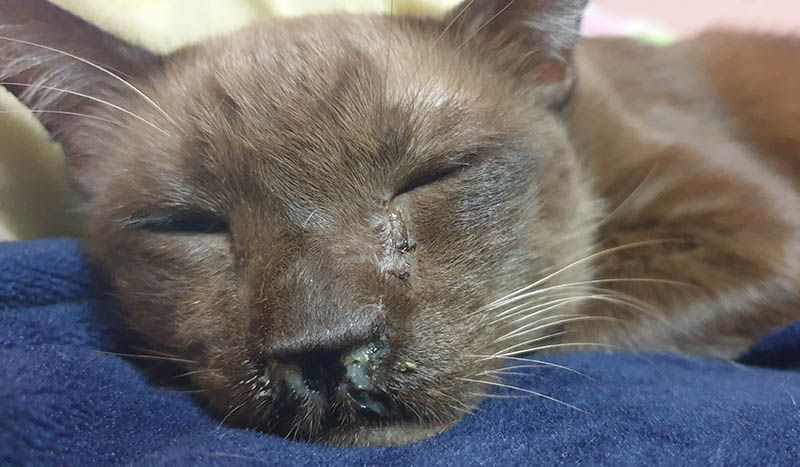
Cats have a reputation for being independent, even indifferent, but they will actually look for safety and help from their humans. They may not display weakness easily and show only subtle signs of feeling ill, but there are some cues that you can pick up on when your cat’s not feeling their best.
By being observant, you can increase the chances of catching something in the early stages and get your cat help as soon as possible. Here are some signs from your cat that may indicate that it’s feeling sick.
The 11 Vet-Approved Warning Signs Your Cat Is Crying for Help
1. Changes in Appetite
Your cat’s appetite can indicate several different kinds of health issues. Cats can lose their appetite if they have dental problems, digestive issues, or kidney disease. They can also be reluctant to eat if they’re feeling stressed out or unsafe. This often happens when your cat experiences significant environmental changes, like moving to a new house or having a new baby or roommates in the home.
An increase in appetite can also be triggered by an underlying health issue. Some health issues that can cause increased hunger include intestinal parasites, nutrient insufficiencies, hyperthyroidism, and diabetes mellitus.

2. Litter Box Usage
Keeping track of your cat’s litter box habits is a great way to keep track of your cat’s health. Changes in your cat’s litter box usage may point to an underlying health issue. Increased urination or painful urination can be a sign of various health issues, such as urinary tract infections, kidney disease, and diabetes.
Sometimes, cats may start going to their litter boxes more frequently if they’re constipated. They may try to keep relieving themselves multiple times a day without pooping and can start straining or crying in pain.
Toileting inappropriately, like peeing in the sink or pooping outside the litter box can also be signs of illness or stress in your kitty.
3. Energy Levels
Both increased and decreased energy levels can indicate that your cat’s not feeling well. Decreased energy and lethargy can point to a plethora of issues, including depression, arthritis, dehydration, anemia, and heart disease.
Your cat can appear more energetic or restless if they’re feeling sick. Pacing isn’t really a behavior that cats engage in regularly, so it can indicate that something is wrong internally. Cats can start to pace if they’re feeling pain. Pacing can also be a sign of toxicosis, liver diseases, endocrine diseases, or cognitive dysfunction. Hyperactivity in older cats can also be a sign of an overactive thyroid gland.
4. Body Language and Posture
Your cat may express illness through its body language and posture. For example, many cats will hunch if they’re not feeling well. Cats that feel scared or uneasy may have dilated pupils and ears lying flat against their heads. Their hair may also be raised, and they may tuck their tails close to their bodies if they’re feeling unsafe.

5. Neediness
Some cats that strongly trust their owners may start to act more needy when they’re feeling sick. They can seek comfort when they’re feeling stressed or anxious. In some cases, they may act more needy if they’re feeling unsettled internally.
Cats may try to get their owners’ attention more frequently by rubbing against them or standing right in front of them. Cats can also become more vocal as a means of trying to get their owners to pay attention to them.
6. Hiding or Being Withdrawn
Cats with more reserved personalities may act more withdrawn. They can retreat to hiding places as a means of preventing others from seeing that they’re vulnerable and weak. A common reason why cats retreat is due to injury. So, check on your cat’s gait and for any limping if you notice increased hiding.
Keep in mind that hiding is a common behavior in cats. Therefore, it’s not always indicative of an illness or injury. Hiding can get concerning if it’s preventing your cat from eating and using its litter box regularly.
7. Changes in Weight
Changes in weight aren’t always caused by diet and exercise. Significant weight loss may indicate parasites, diabetes, hyperthyroidism, or cancer. Stress can also cause weight loss in cats.
Weight gain can also indicate both behavioral and health issues. Cats experiencing boredom can eat more than usual or exercise less, leading to obesity. Sometimes cats can develop abdominal distension due to problems with the heart or liver, or infectious peritonitis, and this distension may have the appearance of weight gain.

8. Coat Health
Your cat’s coat health can indicate several underlying issues. Cats that are bored or depressed may not engage in self-grooming, while some cats may self-groom compulsively, causing bald patches. Some cats that are overweight or obese may have difficulty with self-grooming, so coat health can be affected by weight gain.
Hair loss, or alopecia, can be caused by infections from bacteria, fungi, or parasites. Skin inflammation may also contribute to alopecia. Dry and brittle hair can indicate certain nutrient deficiencies or be signs of an autoimmune disease. An ill-kempt or smelly coat may be an indicator of kidney dysfunction or dental disease as they groom themselves with thick, smelly saliva.
9. Difficulty Breathing
Your cat can be out of breath after exercising, particularly in warm weather, but it is quite rare for them to pant purely from physical exertion. Because cats are masters of masking the signs of illness, ANY form of respiratory difficulty, even panting without obvious reason, should be treated as an emergency. Cats will compensate for respiratory problems extremely well, so if they are exhibiting signs of problems, it usually means that the problem is severe or quite advanced. Difficulty breathing, or dyspnea, can point to several different health issues, including heart disease, asthma, respiratory infections, or viral diseases.
Other ways that cats can demonstrate problems with breathing include:
10. Eye Discharge and Runny Nose
Make sure to check your cat’s face to ensure it’s free of any discharge. Your cat shouldn’t have any mucus running down their nose, and their eyes should be clear and not red or watery. Watery eyes can indicate allergies, a cold, or upper respiratory infections. Redness or inflammation are usually signs of an infection. Squinting or keeping the eyes closed a lot may indicate pain from an ulcer or even glaucoma.

11. Purring
This might seem like an odd one, but purring can sometimes be a sign of illness, particularly in older cats or those suffering with a chronic illness. Apart from being a sign of happiness, it is believed that purring also releases endorphins, further contributing to a feeling of contentment. It is not uncommon for very elderly cats or cats in pain to purr as a method of self-soothing. So if your cat is purring but also not seeming like their normal self, it is worth having a vet take a look.
Conclusion
Some cats may make it very clear when they’re not feeling well, while others will try to hide their afflictions. So it’s important to understand normal cat behavior to become more aware when something’s off with your cat. You can get important clues about your cat’s health by being observant of their appearance and behavior. If you notice sudden or subtle changes in your cat, it’s often best to schedule an appointment with your veterinarian. Your veterinarian can diagnose any underlying health issues and give you a treatment plan to help your cat feel better and return to their normal self.
Remember, if you think something is wrong, you’re probably right, so it’s always better to get them checked.
Featured Image Credit: Nils Jacobi, Shutterstock







